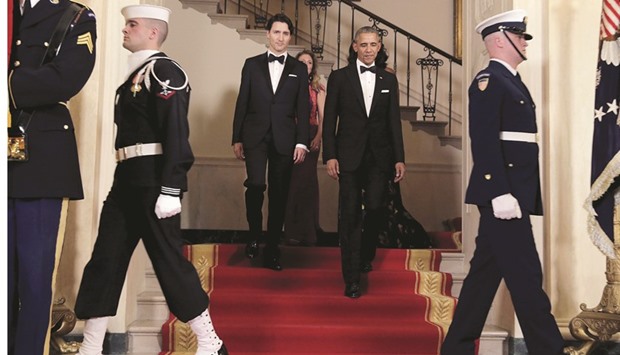When President Barack Obama welcomed Canadian Prime Minister Justin Trudeau for a state visit to the White House on Thursday, it was like looking back in time seven years.
Like Obama, Trudeau, a charismatic young politician with a liberal vision, rode a wave of idealism to the nation’s highest office only to quickly learn it’s not easy trying to turn campaign slogans into real changes.
The leaders - one just coming into office and one getting ready to leave office - have so much in common that Twitter quickly declared the fledgling relationship a “bromance”.
“Being able to draw on his experience and his wisdom as I face the very real challenges that our countries, and indeed our world, will be facing in the coming years is something that I appreciate deeply,” Trudeau said at a news conference in the Rose Garden.
Obama has said that seeing Trudeau on his election night in October reminded him of his own win in 2008, and his aides say the two leaders are developing a “special relationship” based on their ages, visions and goals. From their first meeting, foreign policy analysts say, the men dismissed with formality and began addressing each other as “Barack” and “Justin”.
On Thursday, a now-graying Obama jokingly offered the 44-year-old son of the late prime minister Pierre Trudeau some advice. “If, in fact, you plan to keep your dark hair, then you have to start dying it early,” he said. “You hit a certain point, it’s too late. You’ll be caught.”
Obama spoke after welcoming Trudeau to the White House for Canada’s first state visit in 19 years in a formal arrival ceremony on the South Lawn complete with a red carpet, a military honour guard and a 21-gun salute. Hundreds of people, including many young children, waved small US and Canadian flags.
It had quite a different feel than previous visits of older world leaders without the celebrity status that Trudeau carries. “Oh my God,” one star-struck woman screamed as Obama and Trudeau walked the South Lawn to greet visitors.
Foreign policy analysts say Trudeau would be wise to work as closely - and as quickly - as possible with Obama. The urgency, analysts say, comes from the prospect of Republicans Donald Trump or Ted Cruz in the White House next year, espousing values and policies that are an anathema to the liberal Trudeau government.
“This is a time to think through some of the front-burner questions,” said John McArthur, a Canada specialist in the Global Economy and Development programme at the Brookings Institution, a centre-left policy research centre. “One administration is in its last year and another in its first year, so there are a few things that are overlapping.”
Trudeau should “go for broke”, urged the Canadian Global Affairs Institute, an Ottawa-based foreign policy research centre, in a study released this week. The report, titled “A Canadian Agenda: Obama and Beyond”, warns that the next US administration is likely to be “more susceptible to protectionist and nativist impulses around trade and security”. So, the Canadian study concluded: “The more we can do in the remaining months of the Obama administration to inoculate ourselves, the better.”
The institute’s report argues that an already tight bilateral bond should be strengthened through closer collaboration on security, trade, climate and the shared Arctic, an agenda that’s “entirely compatible” with Trudeau’s so-called liberal internationalism.
The report suggests that laying this foundation could help Canada win leverage with the incoming US president.
Trudeau did not wade into the US election on Thursday, but Obama pushed back on accusations from former Louisiana Governor Bobby Jindal and others that he bears responsibility for the rancour of the Republican primary and the rise of presidential front-runner Donald Trump.
“What I’m not going to do is validate some notion that the Republican crackup that’s been taking place is a consequence of actions that I’ve taken,” Obama said.
In their private meeting, the two men discussed climate change, trade and national security.
They announced an agreement to seek a 40% to 45% reduction in methane emissions by the oil and gas industry by 2025 in existing and new sources. The industry is the largest source of methane emissions.
“For the first time, the United States is taking concrete measures to rein in methane leaks from existing oil and gas infrastructure that will protect the atmosphere and people’s health,” said Sam Adams, US climate director for the World Resources Institute.
The leaders also vowed to protect the Arctic with programmes to safeguard more than 10% of marine areas, to recognise shipping corridors with low environmental impact, and to create new offshore oil and gas drilling standards.
Obama said they did not have a breakthrough on one of their largest trade disagreements over softwood lumber, but the two did vow to make it easier for people and goods to move across the border.

President Barack Obama walking with Prime Minister Justin Trudeau before a state dinner at the White House in Washington on Thursday.
